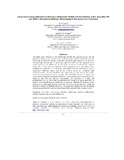Please use this identifier to cite or link to this item:
http://hdl.handle.net/10311/1114Full metadata record
| DC Field | Value | Language |
|---|---|---|
| dc.contributor.author | Jankie, D. | - |
| dc.contributor.author | Garegae, K.G. | - |
| dc.contributor.author | Tsheko, G.N. | - |
| dc.date.accessioned | 2013-02-06T13:01:43Z | - |
| dc.date.available | 2013-02-06T13:01:43Z | - |
| dc.date.issued | 2011-06 | - |
| dc.identifier.citation | Jankie, D. et al (2011) Using focus group interviews to research adolescents' beliefs and perceptions of sex, sexuality, HIV and AIDS in educational settings: methodological successes and challenges, International Journal of Scientific Research in Education, Vol. 4, No. 2, pp. 131-141. | en_US |
| dc.identifier.issn | 1117-3259 | - |
| dc.identifier.uri | http://hdl.handle.net/10311/1114 | - |
| dc.description.abstract | The paper draws attention to the relationship between the research process and the production of knowledge on adolescent sexual behaviours and HIV and HIV and AIDS issues by adolescents in Botswana schools. Within this context the paper addressed the successes and challenges experienced in conducting single and mixed sex semi-structured focus group interviews with adolescents in four junior secondary schools. It also explored adolescents’ feelings about participating in focus interviews that that explore issues regarding sex, sexuality, HIV and AIDS. Data drawn from the interviews as well as researchers’ reflections suggest that the use of focus groups as a qualitative data collection strategy opened possibilities for adolescents to share diverse knowledge, experiences and perspectives on sex, sexuality, HIV and AIDS. Likewise, it suggests that various factors enhanced and limited adolescents’ participation in focus group interviews. Moreover, this data also provides opportunities for researchers to rethink and problematize ways in which they conceptualize and utilize focus group interviews in research-based knowledge with adolescents in particular. Although the intention of this paper is not to make generalizations about the use of focus group interviews within the Botswana context, the findings reported in this paper have implications for developing and promoting culturally sensitive research approaches relevant to this country/society. | en_US |
| dc.language.iso | en | en_US |
| dc.publisher | IJSRE, http://www.ijsre.com | en_US |
| dc.subject | HIV/AIDS | en_US |
| dc.subject | Focus group interviews | en_US |
| dc.subject | Adolescents | en_US |
| dc.subject | Research methodology | en_US |
| dc.subject | Gender | en_US |
| dc.subject | Sexuality and education | en_US |
| dc.subject | Reflexivity | en_US |
| dc.title | Using focus group interviews to research adolescents' beliefs and perceptions of sex, sexuality, HIV and AIDS in educational settings: methodological successes and challenges | en_US |
| dc.type | Published Article | en_US |
| dc.link | http://www.ijsre.com/Vol.,%204_2_-Jankie%20et%20al.pdf | en_US |
| Appears in Collections: | Research articles (Dept of Languages & Social Sciences Education) | |
Files in This Item:
| File | Description | Size | Format | |
|---|---|---|---|---|
| Jankie_IJSRE_2011.pdf | 2.05 MB | Adobe PDF |  View/Open |
Items in DSpace are protected by copyright, with all rights reserved, unless otherwise indicated.
